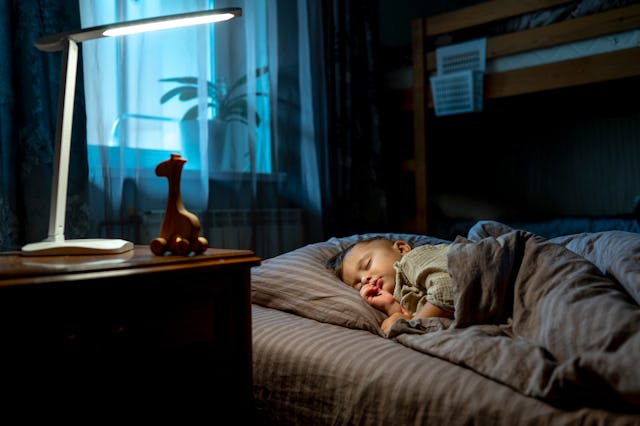This Now-Viral Video Will Convince You To Close Your Bedroom Doors At Night
The aftermath of one TikToker's house fire is all the incentive you need.

Do you sleep with your bedroom door open at night? Your kids’ doors as well, right? Makes sense. As a parent, you want to feel as though you’ll be able to hear your child if they call out for you after bedtime, cry, or if anything goes bump in the night. But, ironically, closing everyone’s bedroom doors at night can actually help keep your family safe.
Of all the things parents worry about when attempting to protect their children, fire safety is often forgotten or pushed back. No one wants to think about the very real possibility that their home could catch on fire. Nor does anyone want to scare their children and cause nightmares during safety prep for everything from stranger danger to tornado drills. However, fires happen for all sorts of reasons, and a few simple steps can go a long way toward minimizing the danger.
One of the simplest steps you can take? You guessed it: Closing bedroom doors before everyone drifts off to sleep.
Why is it so important to close bedroom doors at night?
In June 2022, TikTok user Mercedes Carmien (MercedesVivien) went viral after a tragic house fire destroyed her family’s home. It started with some bad electrical wiring in her bedroom and quickly spread throughout the entire home. “Our house burned down last week,” Carmien shares at the beginning of a video tour of the fire’s aftermath that has amassed over 4 million views to date. “Let me show you why you should always sleep with your door closed.”
The reason she gives? One area of her home remained virtually untouched: her kids’ room. Mercedes attributes the unscorched room to her daughters’ closed bedroom door.
Carmien isn’t alone in sharing the warning about closing bedroom doors. Most homeowners’ insurance companies also advise people to close their doors at night. Not only does the closed door initially keep out the rolling smoke, but since doors are often built with more layers and compacted surfaces, they tend to do a better job keeping flames at bay.
Due to the uptick in the use of synthetic materials in furniture and construction, fires can now spread faster. According to the safety science organization UL, the time to escape a house fire today has been reduced to just three minutes. Forty years ago, residents of a home had an estimated 17 minutes to escape.
Can your family bug out in just three minutes? Closing your doors at night could help buy you a bit more time.
Does it really make that big of a difference?
According to a survey conducted by UL, nearly 60% of people sleep with their bedroom door open. But as the UL Firefighter Safety Research Institute (FSRI) explains in the “Close Before You Doze” campaign, a closed door can dramatically slow the spread of fire, toxic smoke, and carbon monoxide. Research shows a closed door can mean the difference between 1,000 degrees and 100 degrees in the event of a fire. And during a fire, a closed door can keep carbon monoxide levels at 1,000 PPM versus 10,000 PPM when a door is left open.
“As fire service researchers and professionals, we encourage people to take several precautions and have an evacuation plan, but closing doors at night is one simple and quick routine anyone can adopt right now. It’s a very simple behavior change that can help save your life and your loved ones,” explained Steve Kerber, vice president and executive director of the UL Firefighter Safety Research Institute.
Another smart tip shared by FSRI is to shut bedroom doors when you leave home, which could minimize damage (and buy fire emergency professionals more time to save your residence) if a fire breaks out when you aren’t there.
What else can you do to help protect yourself in the event of a house fire?
If anyone knows a thing or two about fire safety, it’s the Red Cross. They have a ton of solid advice for protecting your home and loved ones during a fire.
- Install smoke detectors on every level of the home, outside sleeping areas, and inside each bedroom.
- Create a fire escape plan, have two possible exits from every room, and perform practice fire drills at least twice a year.
- Check your smoke detectors monthly and replace batteries as needed.
- Get out and stay out. Never go back into a burning building
- Call 9-1-1
The start of the year is an ideal time to formalize your family’s fire safety plans and protocols. Up first? Closing those bedroom doors at night.